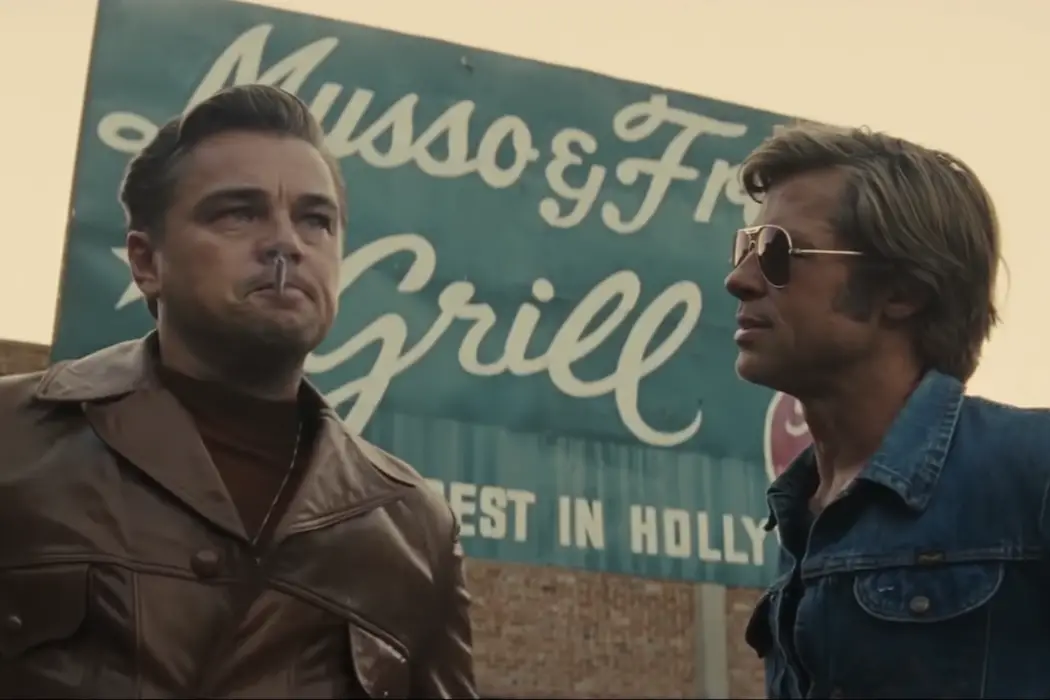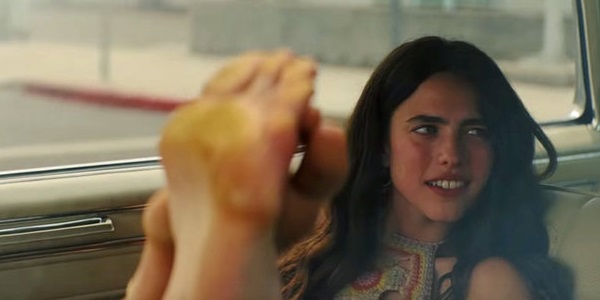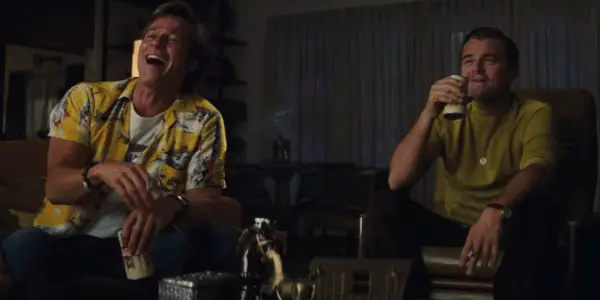ONCE UPON A TIME IN HOLLYWOOD: Tarantino’s Timeless, Meta Masterpiece Is The Ultimate Ode To Cinema

Rachael Sampson is a Yorkshire screenwriter and film critic. She…
The wait is over and the 9th film by Quentin Tarantino is finally here for the UK viewer. If you are reading this review from across the pond, you might have already seen the picture and had weeks to digest it. I, however, have just got home from the cinema with the film fresh in my mind and a feeling of deep reverence in my body.
This is possibly the last, or second to last movie Tarantino will give us, and with that in mind, it is clear he has written a beautifully profound love letter for one of his final works. The address evidently reads “Hollywood, Los Angeles”; the world he grew up in and continues to devote his life to.
Tarantino‘s letter might not be addressed directly to us (the audience), but it certainly isn’t private and confidential. We, as film lovers, are the foundation of the industry. We dictate the success of these projects, therefore Hollywood in a sense, works for us. Tarantino provides us with a stepladder to see past the camera/over the fourth wall, as he exposes The Good, the Bad and the Ugly aspects of trying to survive and thrive in the business from the performers perspective. (Clint Eastwood pun intended).
Familiar Faces and Foot Fetishes
It’s hard not to revel in the fact that the movie of the summer (or debatably, even the year) is finally here, and it has greeted us like an old friend. Actors we now only tend to see in his films such as Michael Madsen, Kurt Russell and his trusty stunt woman Zoe Bell, let the reality sink in that we are now back in the Tarantino universe.

Faint undertones of Jackie Brown can be felt, as well as hints of Death Proof – with the whole stuntman storyline. Citations to his other movies are scattered everywhere, referencing Antonio Marghereti (you’ll mentally hear Eli Roth slowly pronouncing “Marghereti” when you see it for yourself), Red Apple cigarettes, the Django Unchained movie set and Nazi’s being burnt alive. It wouldn’t be a Tarantino movie without having a pair of women’s feet shoved right in your face at some point in the film. This time we get Margot Robbie and Margaret Qualley‘s dirty tootsies in our grill. (Oh Quentin, how we have missed you).
The echoing voice from the real world around violence in cinema is also highlighted when a member of Charles Manson’s family says “kill the people who taught us to kill” – insinuating they’ve been indoctrinated to do so through fictitious murder on film and TV. A reference to the scrutiny Tarantino has faced throughout his career for making controversial pictures. (Click here to read more on copycat crime inspired by his films.)
Old and New Hollywood
If you haven’t seen the trailer already/know the basic premise of the story, Once Upon A Time In Hollywood explores the on and off-screen lives of Rick Dalton (Leonardo DiCaprio) and his stunt double Cliff Booth (Brad Pitt). Rick never made that TV to film transition like many other spaghetti western actors in the 60’s, and is subsequently riddled with anxieties about his future in Hollywood.
As we watch the turbulence of Rick and Cliff’s careers, Tarantino interweaves the tale of Sharon Tate (Margot Robbie), whilst paralleling the unusual activities of Charles Manson’s cult. Rick, Cliff and Sharon all represent different takes on one archetype; three diverse byproducts of the same glitzy industry.

Rick represents old Hollywood, whereas Sharon represents the new, a poetic narrative tactic comparable to The Great Gatsby with the old and new money divide. Cliff on the other hand, is the unsung hero who lives in a trailer and “carries the load” of Rick and the industry in general – someone needs to throw themselves off buildings and dive in front of moving cars to get that money shot.
The reason this feels so transcendent and symbolic is due to how insanely meta and close-to-home it is for the cast. Look at Margot Robbie and Leonardo DiCaprio; they are in a sense, their characters. DiCaprio has been in the game for decades, whereas Robbie has practically just arrived. Their performances, albeit sometimes comical and farcical – remember this is a Tarantino movie we are talking about, are accurate. The film is fictional yet paradoxically representative of the industry then, and now. This meta-method places the film on an incredibly high pedestal.
The Acid-Dipped 60’s
If you are expecting a film all about Charles Manson, his infamous drug-fuelled cult and the murder of Tate, then you will be disappointed. (There are lots of YouTube documentaries that expose the horrific events of that night in August, as well as a cringeworthy re-enactment on Netflix starring Hillary Duff and Aaron from Mean Girls if you want to learn more). In Once Upon A Time In Hollywood, the storyline of the Manson family plants the narrative within our world, giving us historical context and a sense of realism.
We all know the notorious tale of Sharon Tate’s murder. To watch another re-enactment would be predictable and unoriginal – two things Tarantino definitely isn’t. This film explores the life of Tate; so many are fixated on her death, but we are informed of her legacy and all that is good and pure in Hollywood – some might say that’s a rare find today.

This film was not only well awaited due to it being a Tarantino flick, but because of the awkward moment at Cannes when a reporter asked about the directors conscious decision to not give Robbie as many lines as DiCaprio and Pitt. He “rejected” her question, and this heated moment meant we were patiently waiting to form our own opinion on the matter. Yes, Robbie has fewer lines, but she tells Sharon’s story through many other ways. Plus, Tate wasn’t a chatty Cathy; her calming demeanour and soft spoken lines were representative of Tate entirely. (Click here to read about the uncomfortable moment at Cannes.)
As love, drugs and body hair grows, so does Tarantino‘s ability to transport his audience into the late 60’s. A bottomless budget no doubt helped with perfect mise-en-scene and costume. He even shot some of Rick’s on screen moments with a 1960’s camera, blending DiCaprio in with the stars of that era. It feels nostalgic even for me; a 90’s kid who would watch grainy Doris Day movies at her Grandma’s house.
The soundtrack only includes songs of that time period to capture the true essence of swinging sixties (with music from Los Bravos and Simon and Garfunkel). A different approach from his previous works such as The Hateful Eight, where The White Stripes play over a movie set several years after the American Civil War.
Once Upon A Time In Hollywood: Conclusion
Possibly being the penultimate movie by Tarantino, his love letter to the industry has been well received – just before he puts down the clapper board. There is evident catharsis in giving back to all that made you, and for Quentin Tarantino, that is film. He has a knack for planting us in a parallel universe; whether that is once upon a time in Nazi-occupied France or Hollywood. He isn’t afraid to reshape and play with the truth, making this picture one of his boldest and bravest to date.
The title of his latest film is representative of the ultimate American dream. To some that’s Hollywood stardom and to others that’s mass murder for God-like status. 50 years later and these polar-opposite dreams are still in pursuit, more so than ever. Once Upon A Time In Hollywood shows us a fictitious world that was undoubtedly plausible. We can always say “what if…?” – and that is Tarantino‘s mantra. He manipulates history to satisfy the unsettling itch of reality.
What did you think about Once Upon A Time In Hollywood? Share your thoughts and comments!
Does content like this matter to you?
Become a Member and support film journalism. Unlock access to all of Film Inquiry`s great articles. Join a community of like-minded readers who are passionate about cinema - get access to our private members Network, give back to independent filmmakers, and more.
Rachael Sampson is a Yorkshire screenwriter and film critic. She often finds herself daydreaming about Andrea Arnold's filmography or crying over The Graduate.












